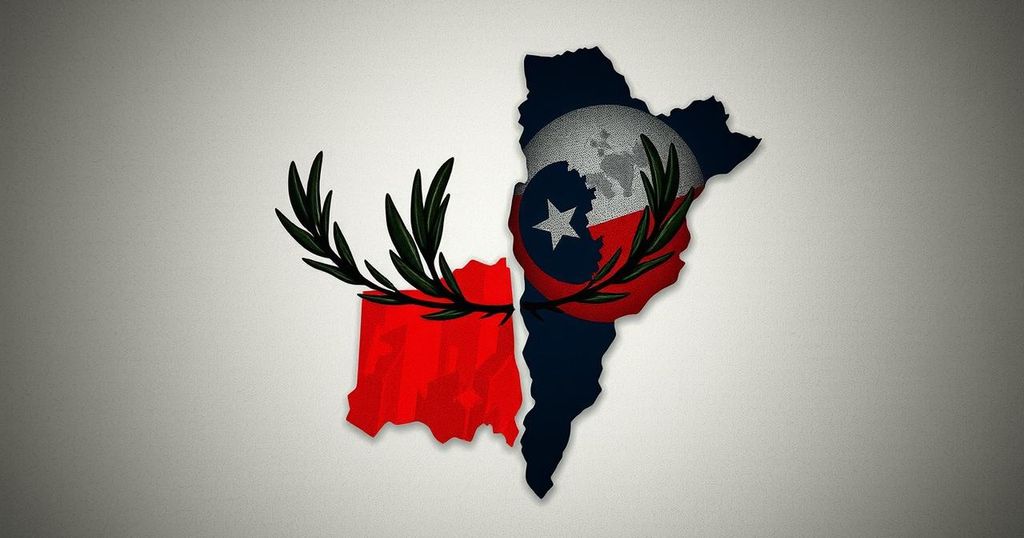President Trump’s controversial plan to relocate Palestinians from Gaza has been met with widespread condemnation and significant obstacles. Arab leaders have rejected the proposal, seeing it as ethnic cleansing. The plan threatens ceasefire efforts and does not consider the historical connection of Palestinians to Gaza. Key regional nations assert that a Palestinian state is essential before normalization with Israel.
President Donald Trump’s recent proposal to relocate a significant number of Palestinians from the Gaza Strip for development as a tourist attraction has incited shock and controversy in the region. Many perceive this initiative as ethnic cleansing, attempting to displace the Palestinian people who have endured extensive hardships following a prolonged offensive against Hamas that has devastated their homeland. The proposal is seen as an undermining of their quest for statehood, a sentiment strongly supported by the global community.
The backlash from Arab nations, including close U.S. partners such as Egypt and Jordan, has been swift and decisive, with leaders expressing clear rejection of Trump’s suggestion that they accept more Palestinian refugees. Notably, Saudi Arabia has affirmed its stance against resettlement, insisting on the necessity of establishing a Palestinian state, with East Jerusalem as its capital, before normalizing relations with Israel.
Concerns also arise from how this plan might destabilize fragile ceasefires and efforts to negotiate the release of hostages taken during Hamas’s October 7 attack, which initiated the current conflict. While Trump claims credit for mediating the ceasefire, the implications of his proposal cast a shadow on its sustainability.
The Palestinian perspective regards Gaza as an essential part of their national identity, and many seek to establish independence encompassing Gaza, the West Bank, and East Jerusalem—land Israel occupied in the 1967 war. The sentiment of returning home remains strong among the Palestinian diaspora, as exemplified by a large return to northern Gaza despite its destruction.
Both Hamas and the Palestinian Authority have jointly condemned Trump’s plan, as the latter continues to negotiate with Israel over security matters. Historically, Jordan and Egypt have resisted resettlement ideas, fearing that inclusion of Palestinians could exacerbate regional instability as witnessed in past civil unrest and economic strains.
While Trump suggested that wealthy Gulf nations might subsidize resettlement costs, this notion has been met with skepticism. Both Saudi Arabia and the UAE have quickly rejected the idea, emphasizing the urgency of establishing a Palestinian state, a view echoed in Saudi Crown Prince Mohammed bin Salman’s recent comments.
Economic pressure from the United States could affect Egypt and Jordan, which rely on American assistance; however, these nations wield significant influence regarding national security and regional stability. Egypt has warned that transferring Palestinians into Sinai could jeopardize its treaty with Israel—a fundamental aspect of peace in the region.
Additionally, Egypt and Qatar have played vital roles in mediation efforts with Hamas and are working closely with Trump’s envoy, Steve Witkoff, to extend the fragile truce. While the idea of mass transfer has typically been a fringe sentiment in Israeli politics, recent mainstream endorsements from leaders like Prime Minister Benjamin Netanyahu raise concerns about its serious implications.
Netanyahu acknowledged the shock elicited by Trump’s unconventional approach, yet credited his thinking as valid, suggesting a need for exploration. Figures such as Benny Gantz also expressed interest in considering Trump’s ideas, while others maintained that the immediate priority remains the release of hostages.
The ongoing negotiations regarding hostage exchanges are pivotal, with Hamas asserting conditions that complicate any potential transfer initiatives. Israeli officials, particularly from the far-right, welcomed the idea but recognized that resuming conflict risks hostage lives and might not eradicate Hamas’s presence.
Speculation persists that Trump’s proposal serves as an initial bargaining tool to facilitate future negotiations, akin to his past dealings, including pressure tactics on trade agreements. Previous initiatives concerning Israeli annexation in the West Bank faced obstructions, further underscoring the complex political landscape regarding Palestinian issues.
In conclusion, the regional response to Trump’s Gaza plan indicates widespread apprehension among Arab allies and Palestinians alike, as it threatens to undermine fragile peace efforts and perpetuate injustice. As discussions continue, clarity may emerge regarding the viability of Trump’s proposals during his meeting with Jordan’s King Abdullah II next week, which may provide additional insights into possible future developments.
The context of President Trump’s Gaza plan involves ongoing tensions related to the Israeli-Palestinian conflict, which has existed for decades. His proposal suggests forcibly transferring Palestinians from Gaza to create a tourist-friendly area, which many view not only as a radical policy but also as an infringement on the Palestinian right to their homeland. These issues are compounded by historical grievances dating back to the creation of Israel in 1948 and subsequent wars that have left millions of Palestinians stateless or in refugee situations. Resistance from significant regional players, coupled with the potential destabilization of ceasefire agreements, highlights the complexities involved in foreign policy surrounding the Israeli-Palestinian dynamics.
In summary, President Trump’s Gaza plan has elicited strong criticism and concerns regarding its feasibility and humanitarian implications. The notion of forcibly transferring Palestinians is opposed by both the affected communities and key Arab nations, further complicating negotiations for peace and stability. As the dynamics evolve, with significant meetings on the horizon, the enduring quest for Palestinian statehood remains at the forefront of regional discourse, alongside various geopolitical pressures influencing the outcome.
Original Source: abcnews.go.com




